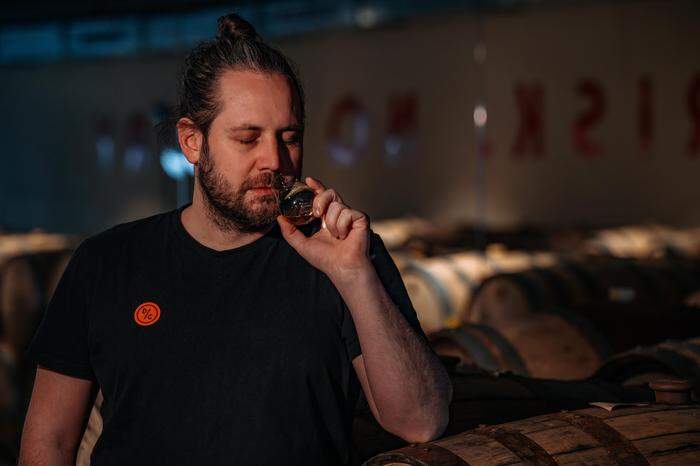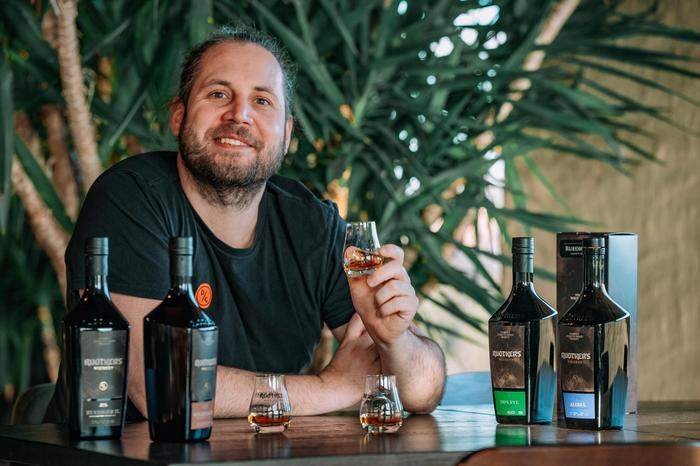40 hectares of grain area. That's a lot. But nothing unusual for grain countries like Austria. But here, in idyllic Riegersburg in southeastern Styria, things are very unusual: here the grain grown on the Kolles family's farmland is mostly distilled, meaning it is processed into spirits. And especially with whiskey. It is unusual in many ways. On the one hand, because 40 percent of the grain in this country is processed as animal feed. On the other hand, spirits in Austria are traditionally made from fruit. Keywords and more. So when David Colless decided to turn rye, spelt, barley, and corn into high-proof spirits, he made it easy for himself. One primarily associated with Ireland, Scotland and the United States. And yet: in his “Ruedgers – House of Whisky, Gin & Rum”, he proves that Austria can make whiskey too.

© Rene Strasser
Opened in 2019, his “Rütgers” house in Lembach near Riegersburg is considered by many spirits lovers to be a pilgrimage site for all kinds of hard liquor. A good 750 of the highest quality and some rare spirits from around the world can be tasted here. And: 800 barrels of our own works are stored here on two floors. Much of it is in the high cellar, one of the most beautiful in the country with two chandeliers above the tasting table. “In Austria, as in many other countries, a whiskey must mature in a barrel for at least three years before it can be sold as whiskey,” explains Coles.
This brings us to one of his heartfelt topics – the different types of casks and their effect on flavor. 60-year-old sherry casks, old rice schnapps casks from Japan, port wine and Blafrankish and Marsala and mezcal casks – there's really nothing here that's lacking. “But the differences between different types of barrels are also important,” Koller explains. “How were they fried?” Are they American or French oak? Are they used or not? All of these affect the taste.

Pleasure in your nose
© Rene Strasser
America's famous bourbon whiskey is a good example of this, Colles explains as a connoisseur. It must be distilled from at least 51 percent corn—and can only be matured in new white oak barrels. “On the other hand, the Scots buy these used bourbon barrels mostly from America. On the one hand, Americans are no longer allowed to use these barrels, and on the other hand, aging in a used barrel is much more elegant than a new one. Of course, if you're not careful, aging in new wood will soon become woody.”
Colless relies primarily on American oak for his whiskeys – used and new. As very few in this country have mastered the craft of whiskey, he eschews any traditional constraints. And experiment, indeed. This is what you smell, taste and feel in his range of whiskeys called Rutgers. The name is a tribute to the builder of Riegersburg in the 12th century.

David Colless “blended” whiskeys from corn, rye, spelt, barley and wheat.
© Rene Strasser
One of the most popular whiskeys from Gölles's Ruotker range is called Ruediger II. Corn, rye, barley, spelt and wheat are processed – according to a tried and tested principle that applies to Colles' other whiskies. Simply put, the grain is first malted, then ground and mashed with hot water. This begins the alcoholic fermentation, after which a double distillation process takes place in copper kettles. Gölles creates a grain variety called Rudiger II in American white oak casks and used sherry casks. Result: Soft, chocolatey aromas with rounded roasted aromas and harmonious spiciness on the palate. “He's the best-mannered of all,” Coles winked.
That's right, the whiskey called Alois Eye is a little cheeky. The roe and corn whiskeys, each spending several years in American white oak casks, finally spend 18 months together as a cuvée – what Colles calls a “blend” – in old plum casks. It results in a very fruity nose with intense grain notes and dry plum aromas on the palate. It also shows how diverse, playful and sophisticated Austrian whiskey can be now. Thanks to local grain varieties – not to mention bold distillers like David Colles, who are always trying new things. And thereby redefine the richness of the local fields.